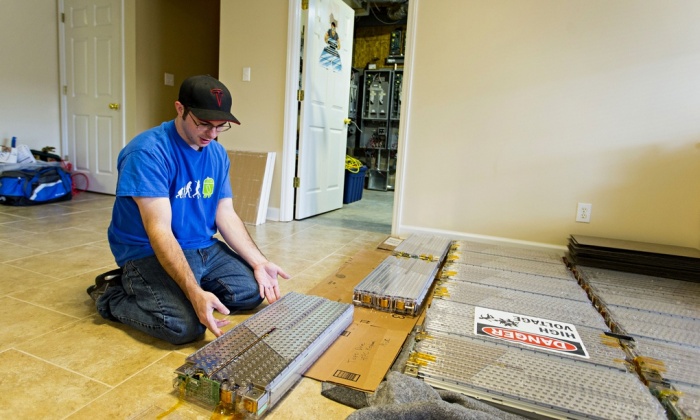
New Jersey is more than a setting for films about unfulfilled potential and losers left behind, it’s also home to the ingenious Jason Hughes, a man who is powering his house through a hacked electric car battery snagged from a none-functioning Tesla Model S. With $20,000 in disposable income and the patience to dedicate a year’s worth of effort, Hughes succeeded in creating a battery storage system for his solar-power system, permitting him to slice off a massive chunk of his electric bill by creating a closed loop for his electricity needs.
His efforts are not those of a rabid environmental tech hippie, but those of an early adopter with the pioneering spirit of a DIYer. Already, the tech start-ups and giants alike are lining up to gobble the battery market and develop a new means of mass production that’ll bring cut battery costs in half, making the creation of robust batteries far more feasible. Take the electric car company Tesla Motors for instance, its ambition to grow the market has led to the $5 billion investment in what’s to become the world’s largest lithium-ion battery factory; dubbed the Gigafactory, the massive operation will double the world’s lithium-ion battery supply once it becomes operational in 2020.
On the flipside, the less tech-savvy amongst us will still be able to reap the benefits of a Tesla-powered house, given Tesla Chief Executive Elon Musk’s confirmation that his company is in the next six months developing a battery pack specific for the home.
The combined effect of the decreasing cost of solar panels and the increased availability of powerful batteries will allow users to become less dependent on energy from the grid, a prospect that is frightening utilities nationwide. To compensate, utilities are permitting users to sell back excess energy at fairly high rates that’ll be reinserted into the grid in a process called net metering. Some have attempted to undermine this process by lowering the buyback rates, but by fighting net metering, utilities are only encouraging the further growth of off-the-grid energy adoption. Experts have acquainted this happened to the landlines inevitable demise at the hands of mobile phones a decade ago.
Advertisement
Learn more about Electronic Products Magazine





